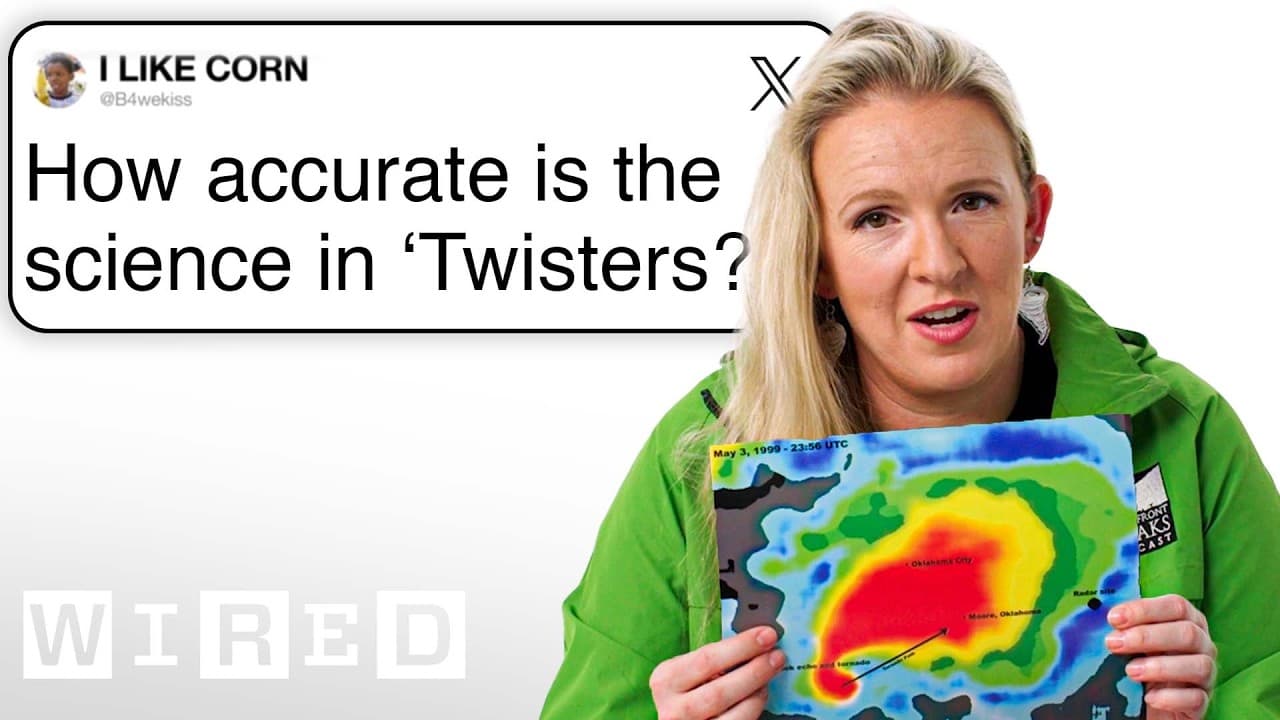Stormchaser Answers Extreme Weather Questions From Twitter | Tech Support | WIRED
16 Jul 2024 (over 1 year ago)

Tornado Formation and Prediction
- Tornadoes occur in Texas, Oklahoma, and Kansas from April to June, but due to climate change, Tornado Alley is shifting eastward.
- Tornadoes form when warm and cold air collide, creating thunderstorms with rotating updrafts called mesocyclones.
- Technological advancements in tornado prediction include improved radar technology, which provides more frequent and detailed data about storms, allowing for earlier and more accurate tornado warnings.
- Radar reflectivity images show the intensity of storms, while velocity images indicate movement towards or away from the storm. A hook echo on a radar image suggests rotation and the possibility of a tornado.
Tornado Safety
- In case of a tornado, it's important to seek shelter indoors, in an interior room without windows, and as low to the ground as possible. Opening windows is a myth and can be dangerous.
Hailstone Formation
- Hailstones form when water droplets in a thunderstorm are repeatedly lifted up and down by strong updrafts and freeze and melt multiple times.
Sahara Dust and Hurricanes
- Sahara dust affects weather in the US by providing moisture and condensation for the formation of hurricanes.
El Niño and La Niña
- El Niño and La Niña are sea surface temperature patterns in the Eastern Pacific that influence weather patterns worldwide by affecting atmospheric circulation and precipitation.
- The 2024 hurricane season is predicted to be above average due to warm ocean waters and the transition from an El Niño to a La Niña year.
Storm Chasing
- Storm chasers use various tools and gadgets to collect weather data, including cameras, weather radios, and anemometers.
Cloud Cover
- Partly cloudy means 3/8 of the sky is obscured by clouds, while partly sunny means 4/8 of the sky is obscured by clouds.
Hurricane Energy and Collisions
- Hurricanes release an enormous amount of energy, estimated to be as much as the entire world's daily consumption or the equivalent of 10,000 nuclear bombs over their lifetime.
- If two hurricanes collide, they would break down each other's systems rather than combining.
Heat Waves and Thunderstorms
- Heat waves occur when hot air persists over a location for a long time, and they can be particularly deadly due to the heat index.
- The smell before a storm is caused by chemical reactions between pollutants in the atmosphere and warm rainfall.
- Thunder is the sound of hot expanding air breaking the sound barrier after a lightning strike.
Lightning Safety
- Lightning can strike the same place multiple times, especially in high-elevation areas.
- If you feel the hair on the back of your neck stand up during a storm, it's a sign you may be hit by lightning.
- Water is a big conductor of electricity, so it's dangerous to be in open bodies of water during a thunderstorm.
- The 3030 rule states that you should wait 30 minutes after the last lightning strike before going outside.